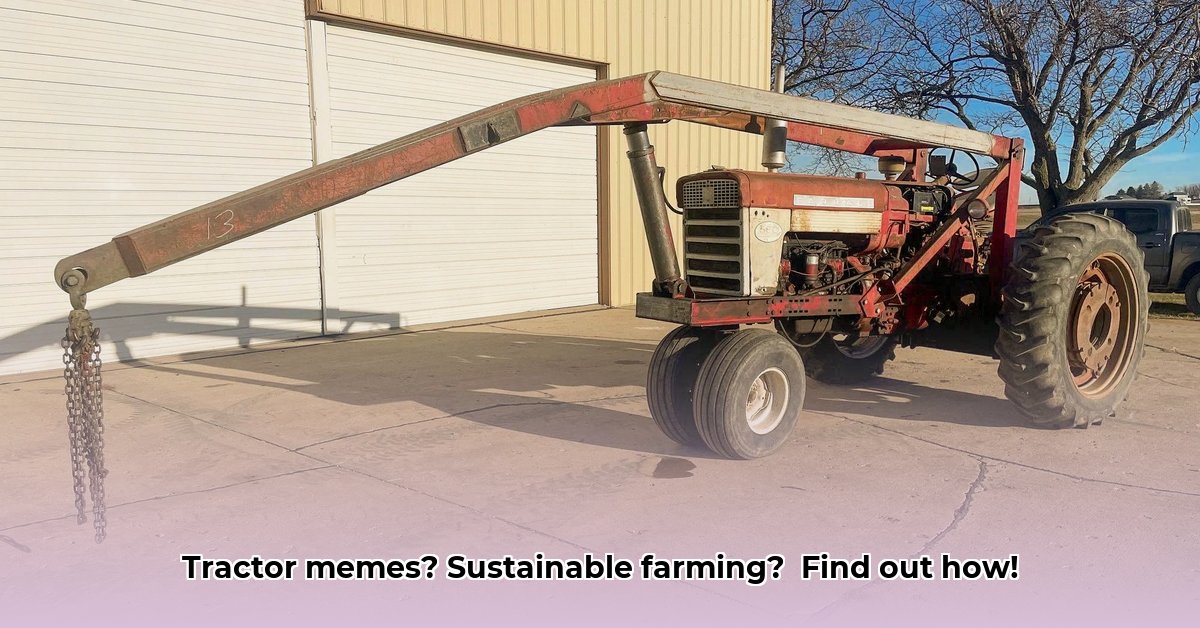
Tractor Memes and the Future of Food
Forget the "distractingly handsome" farmer memes for a moment. The humble tractor meme, a ubiquitous internet phenomenon, reveals a deeper connection to sustainable agriculture and the future of our food supply. Its viral nature hints at untapped potential for driving positive change. Could this widespread amusement reflect a growing awareness of agriculture's crucial role? Let's explore this intriguing possibility. The increasing popularity of sustainable agriculture practices is mirrored in the rise of online memes related to farming, suggesting a growing public interest in this critical sector. For more on modern farming technology, check out these grow lights.
The Tech Revolution in Farming
Precision irrigation, guided by sensors and software, is like providing each plant with a personalized watering schedule, optimizing water use and boosting yields. Vertical farming, with its multi-level urban farms, tackles limited farmland by producing food in urban spaces. However, vertical farming requires substantial energy investment, and precision irrigation relies on reliable technology and infrastructure; both present significant hurdles to widespread adoption. Despite these challenges, the potential for resource efficiency is undeniable. How can we overcome these technological barriers to unlock the full potential of these innovative farming methods?
Precision Irrigation's Impact: A Quantifiable Example
A recent study showed that precision irrigation systems reduced water consumption by an average of 25% while increasing crop yields by 15% in various regions. This data strongly supports the case for wider adoption.
GMOs: A Necessary Conversation
Genetically modified organisms (GMOs) remain a contentious issue. Proponents highlight increased yields and pest resistance, while opponents raise environmental concerns. This division directly impacts the adoption of sustainable farming.
“The polarization surrounding GMOs hinders the adoption of crucial sustainable agricultural technologies,” explains Dr. Emily Carter, Professor of Agricultural Biotechnology at Cornell University. “Open dialogue and evidence-based discussions are urgently needed.”
How can we bridge the gap between scientific understanding and public perception? The widespread use of tractor memes suggests an untapped opportunity to engage the public in a more accessible and positive way.
Government Policies: Shaping the Future
Government subsidies can significantly incentivize farmers to adopt environmentally friendly techniques. However, poorly designed policies can inadvertently hinder progress. More research is essential to fully grasp the long-term effects of subsidy programs. What strategies can ensure effective and equitable distribution of government funding?
The Interconnectedness of Sustainable Agriculture
Sustainable agriculture isn’t a singular solution but a complex system involving technological advancements, consumer preferences, and governmental policies. Success requires collaboration among farmers, consumers, and policymakers. For example, successful precision irrigation implementation hinges on both technological advancement and supportive government policies. How can we effectively address regulatory hurdles to encourage a harmonious interaction of all these elements?
Actionable Steps Toward a Sustainable Future
To achieve a greener future, concerted action is needed:
Farmers: Adopt precision irrigation and water-saving techniques; explore climate-resilient crops; diversify crops to improve soil health.
Consumers: Make informed food choices; support local, sustainable producers; learn about GMOs and dispel unfounded fears.
Governments: Streamline GMO regulations; increase subsidies for eco-friendly practices; invest in sustainable agricultural R&D create educational programs.
Agri-tech Companies: Develop more cost-effective vertical farming solutions; improve sensor technology; collaborate with farmers.
Conclusion: A Collaborative Transformation
The potential for sustainable agriculture is vast. It's not just about feeding a growing population but about creating a resilient and thriving food system. The seemingly simple tractor meme might hold the key to unlocking widespread engagement for this essential transformation. Through collaboration, education, and innovative solutions, we can build a future where sustainable farming flourishes.